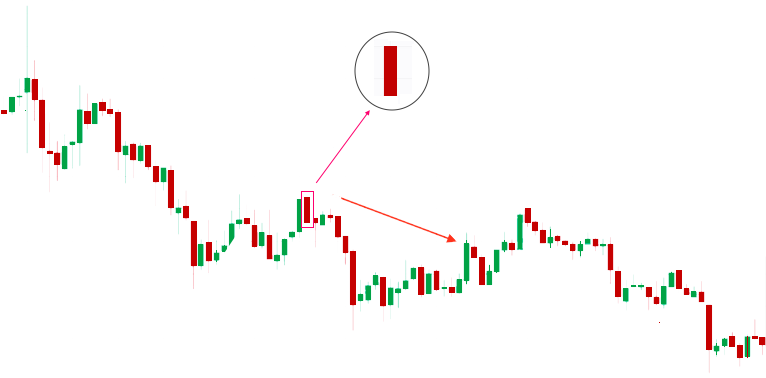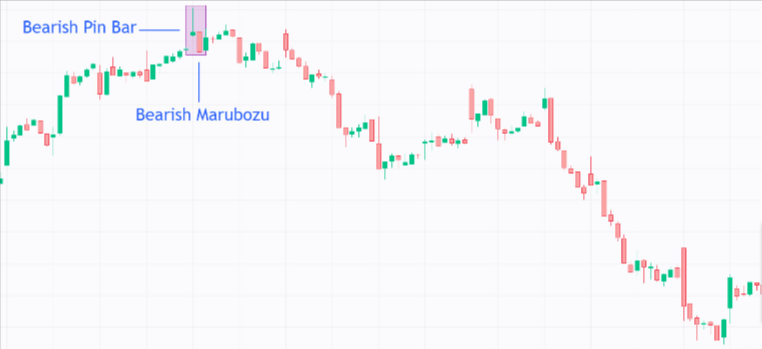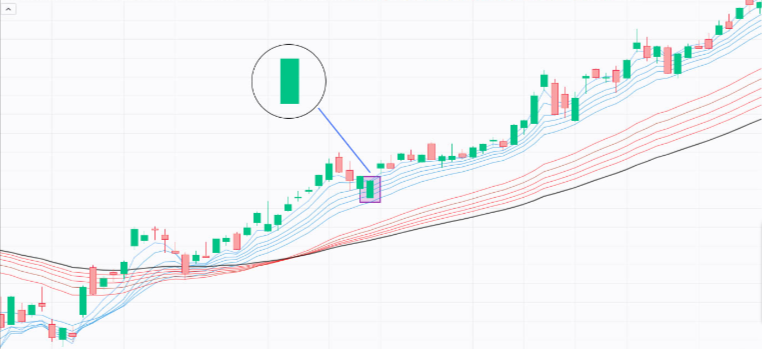In technical analysis, the Marubozu candlestick pattern is a potent tool, often indicating a strong market sentiment in one direction. This single-candle formation can provide traders with significant insight into potential market movements.
Marubozu Pattern: An Overview
The term ‘Marubozu’ originates from the Japanese language, translating to ‘bald’ or ‘shaved head,’ which is fitting considering the pattern lacks upper and lower shadows. A Marubozu candlestick is represented purely by a body, without any wicks or shadow extensions from the top or bottom.
The Marubozu pattern is often seen as a strong signal of conviction by either buyers or sellers, providing a clear indication of the market’s trending direction. This pattern can be either bullish or bearish, depending on the market’s direction.
Understanding the Marubozu Pattern
Bullish Marubozu Pattern
A Bullish Marubozu pattern is characterized by a long green (or white) candlestick without shadows on either end.
The opening price equals the low for the period, while the closing price mirrors the high. This pattern signals that the bulls are aggressively buying the asset, suggesting a potential upward momentum.
Bearish Marubozu Pattern
Contrarily, a Bearish Marubozu pattern is identified by a long red (or black) candlestick lacking upper or lower shadows.
The opening price coincides with the high, while the closing price aligns with the low. The appearance of a Bearish Marubozu indicates significant selling pressure, with sellers driving the market downwards.
The Significance of the Marubozu Pattern
A Marubozu candlestick sends a powerful message – the market is trending strongly in one direction. This characteristic applies to both Bullish and Bearish Marubozu patterns. The pattern signals buyers or sellers are in total control, overwhelming the other side of the market.
For Bearish Marubozu candles, the pattern signals that the sellers dominate, driving the session in the desired direction. Conversely, for Bullish Marubozu candles, buyers are in complete control.
Trading Strategies with Marubozu Pattern
While the Marubozu pattern is relatively straightforward to identify, trading with this pattern successfully requires a combination of other technical indicators and analysis. Below, we discuss three potential trading strategies incorporating the Marubozu pattern.
1. Bearish Marubozu and Bearish Pin Bar Patterns
This strategy combines the Bearish Marubozu and Bearish Pin Bar patterns. The combination of these patterns can provide a powerful signal to enter short positions in the market.
2. Bearish Marubozu, Trend & 50 EMA
One effective strategy for trading Marubozu patterns is to use them in a prevailing trend context, especially when combined with other indicators like the 50-day Exponential Moving Average (50 EMA).
3. Bullish Marubozu and Guppy Multiple Moving Average (GMMA)
This strategy combines the Marubozu pattern with a complex cluster of moving averages known as the Guppy Multiple Moving Average (GMMA). The GMMA is a technical indicator that represents the short-term and long-term trend of the market.
FAQs
What does a Marubozu candle mean?
A Marubozu candlestick in technical analysis has a long body with little to no shadows, indicating strong price momentum in one direction.
There are two types: White (or green) Marubozu, suggesting bullish momentum with the opening price being the session’s low and the closing price high.
Conversely, a Black (or red) Marubozu indicates bearish momentum, with the opening price as the session’s high and the closing as its low. These patterns signify strong buying or selling pressure, respectively.
For accurate predictions, it’s essential to analyze Marubozu in context with other chart patterns and indicators.
Is a Marubozu candle bullish or bearish?
A Marubozu candle can be either bullish or bearish, depending on its color and the direction of the price movement it represents:
- White (or green) Marubozu: This is a bullish candlestick, indicating that buyers controlled the price action from the open to close. The opening price is the session’s low, and the closing price is its high.
- Black (or red) Marubozu: This is a bearish candlestick, suggesting that sellers dominated the price movement. The opening price is the session’s high, and the closing price is its low.
How accurate is the Marubozu candlestick?
The Marubozu candlestick indicates strong momentum, but its accuracy isn’t guaranteed. Its predictive value depends on preceding price action, the overall trend, and other technical indicators. Reliability is best combined with other analysis tools and market conditions. Solely relying on Marubozu can be misleading in trading decisions.
What happens after the Marubozu candle?
The appearance of a Marubozu candle typically indicates strong momentum in a particular direction (bullish or bearish), but what happens after largely depends on the context and the overall market conditions. Here are a few possible scenarios:
- Continuation: Often, a Marubozu candle suggests a continuation of the prevailing trend. For example, a bullish Marubozu in an uptrend may indicate further price rises, while a bearish Marubozu in a downtrend might suggest further declines.
- Reversal: In certain contexts, a Marubozu can signal the beginning of a reversal. For instance, after a prolonged downtrend, a bullish Marubozu might indicate a potential turnaround in sentiment and the beginning of an uptrend.
- Indecision or Consolidation: While the Marubozu itself indicates strong momentum, the subsequent candles might show indecision, leading to a period of consolidation. This can be observed through patterns like Doji or small-bodied candles with wicks on both ends.
- Validation through Confirmation: Many traders look for a confirmation candle after a Marubozu to validate its implications. A second bullish candle following a bullish Marubozu or a second bearish candle following a bearish Marubozu strengthens the prediction.
Conclusion
The Marubozu candlestick pattern is a valuable tool for traders, providing a clear insight into the market’s trending direction. By combining this pattern with other technical indicators or patterns, traders can cut through market noise and increase their trading success probability.
Remember, no strategy guarantees 100% success; trading is all about probabilities and effectively managing risk. Before deploying this strategy with real capital, consider backtesting it on historical data to assess its performance.
Are you a disciplined Trader? Do you follow the rules of Trading?
Sign up for Funding Pips and become the next funded Trader.
- 8 Best Prop Firms USA: Real trader Reviews and Payouts - March 10, 2025
- Forex Trading in Uganda: Start With $10—An Incredible Opportunity on a Tight Budget! - February 24, 2025
- Master Forex Trading Algorithms: Your Path to Success in 2025 - February 17, 2025










